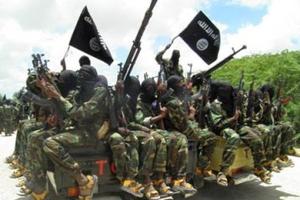Terrorism financeMinnesota banks to stop money transfers to Somalia
In an effort to cut off funds to Somali terrorists, banks in Minnesota will no longer support money transfers via local businesses called “hawalas”; Minnesota has the largest concentration of Somalis in the United States and officials fear that money sent from relatives living in the United States could be funding terrorist groups like al Shabaab

Al Shabaab receives much of it's funding through halawas // Source: tigraionline.com
In an effort to cut off funds to Somali terrorists, banks in Minnesota will no longer support money transfers via local businesses called “hawalas.”
Minnesota has the largest concentration of Somalis in the United States and officials fear that money sent from relatives living in the United States could be funding terrorist groups like al Shabaab.
On 15 December, Franklin Bank, the last remaining bank to support hawalas, will discontinue its wire services to Somalia, which has Somalis in Minnesota panicking. Without hawalas Somalis worry that their families in their home country will have no way of supporting themselves.
Somalia’s financial infrastructure is largely inexistent and many families there depend on remittances from relatives living abroad to survive. To make matters worse, Somalia is currently experiencing one of its worst famines in history.
“This is going to have a massive negative effect on Somali, Kenyan, and Ethiopian populations who are facing one of the worst recorded famines and droughts in recent history,” said Aden Hassan, a spokesman for the Somali American Money Wiring Association
The CIA estimates that Somalia receives roughly $1.6 billion in remittances each year from around the world.
According to Hassen, sending money through hawalas is relatively easy for individuals, but banks who execute the transfers must complete a complicated series of steps to comply with federal standards to ensure that funds are not being sent to terrorist groups there.
New financial regulations were put in place following the 9/11 attacks to crack down on funding to terrorist organizations, which resulted in Wells Fargo, U.S. Bank, and TCF from dropping its support to hawalas.
In Minnesota, Sunrise Community Banks, a local family owned bank which runs Franklin Bank, began working with the Somali community to service hawalas three years ago, but made its most recent decision to end their relationship due to several recent incidents where individuals in the United States were arrested for financing al Shabaab using the hawala system.
In October two Somali women living in Rochester, Minnesota were convicted of funneling money to al Shabaab using hawalas. The two women were accused of going door to door in an effort to raise funds for the terrorist organization. Meanwhile, earlier this month, a woman in San Diego pled guilty to sending money to al Shabaab fighters using hawalas.
David Reiling, the CEO of Sunrise Community Banks, said the bank’s decision was difficult to make given the urgent humanitarian crisis in the region but ultimately concerns over terrorism prevailed.
Reiling said the bank plans to develop a solution that will allow Somalis to safely transfer money without it falling into the hands of terrorist.
“My bank wants to continue wiring money to Somalia but has to find a way to remove the risk,” he said. “The sheer magnitude, of the human need, weighs very heavily on my shoulders. Yes we have a banking issue and we all want to ensure that money does not get into the wrong hands. I think it’s up to all of us to try to find a solution.”
Until a solution is reached, however, “the only way we know at the moment to mitigate that risk is to close these accounts until we can find another solution to work with government to re-establish those lines,” Reiling said.
To help ensure that Somalis in Minnesota can send money to their families, Senator Al Franken (D – Minnesota) has sent letters to Secretary of State Hillary Clinton and Treasury Secretary Tim Geithner urging them to explore alternative methods to transfer money.
”Ending remittances from the United States would be a victory for al Shabab which could claim America was preventing needed funds from getting to suffering Somalis,” Franken said.
